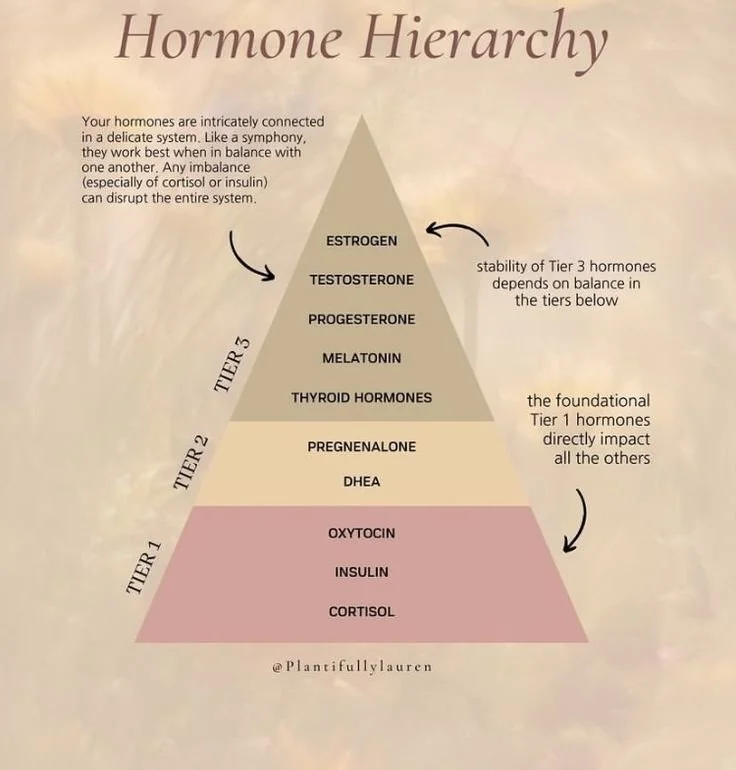Hormone Imbalances
Hormone imbalances occur when there is too much or too little of a hormone in the bloodstream. Because hormones play a key role in regulating many of the body’s functions—such as metabolism, mood, reproduction, and sleep—even small shifts can create noticeable symptoms. Functional medicine explores how lifestyle, diet, environmental exposures, and stress may contribute to hormonal shifts and aims to support the body’s natural ability to restore balance.
What Are Hormone Imbalances?
Hormones are chemical messengers produced by glands in the endocrine system. They control a wide variety of processes in the body including energy levels, menstrual cycles, digestion, immune responses, and sleep patterns. A hormone imbalance refers to any disruption in this delicate system, and symptoms can vary depending on which hormones are affected.
Common Types of Hormone Imbalances
Some of the most frequently discussed hormone imbalances include:
Estrogen Dominance: When estrogen levels are too high relative to progesterone. This may be linked with PMS, heavy periods, fibroids, or breast tenderness.
Low Progesterone: Often seen in the second half of the menstrual cycle, and may contribute to anxiety, insomnia, or irregular periods.
Thyroid Imbalance (Hypo- or Hyperthyroidism): Affects metabolism, energy, mood, and temperature regulation.
Cortisol Dysregulation (Adrenal Imbalance): Often related to chronic stress. Can present as fatigue, poor sleep, or feeling “tired but wired.”
Insulin Resistance: Affects blood sugar balance and may play a role in weight gain, fatigue, and cravings.
Low Testosterone (in men or women): May be associated with fatigue, low libido, and muscle loss.
Signs and Symptoms of Hormone Imbalances
Hormonal shifts can look different for everyone, but some commonly reported symptoms include:
Fatigue that doesn’t improve with rest
Mood swings, anxiety, or depression
Irregular or painful menstrual cycles
Weight gain, especially around the midsection
Sleep disturbances or insomnia
Brain fog or difficulty concentrating
Low libido
Hair thinning or hair loss
Dry skin or adult acne
Hot flashes or night sweats
Hormone Imbalances in Women
Hormone imbalances can show up throughout a woman’s life—from puberty to post-menopause. In addition to PMS or cycle irregularities, symptoms can include:
Fertility challenges
Polycystic Ovary Syndrome (PCOS)
Perimenopause-related changes (e.g., hot flashes, mood changes)
Estrogen dominance or low progesterone symptoms
Thyroid issues, which are more common in women
Hormone Imbalances in Men
Though less talked about, men also experience hormone imbalances. These may be linked to:
Low testosterone
Erectile dysfunction or low libido
Fatigue and lack of motivation
Mood changes or irritability
Muscle loss and weight gain
Sleep issues
What Causes Hormone Imbalances?
Hormonal changes may be influenced by a variety of internal and external factors, including:
Chronic stress and poor sleep
Blood sugar dysregulation
Gut imbalances or inflammation
Exposure to endocrine-disrupting chemicals (e.g., plastics, pesticides)
Nutrient deficiencies
Over- or under exercising
Genetics and aging
How Functional Medicine Approaches Hormone Imbalance
Functional medicine focuses on identifying and addressing potential root causes of hormone dysregulation. Support may include:
Personalized nutrition strategies
Stress reduction and nervous system support
Gut health and detoxification support
Nutraceuticals and herbs that may assist in hormone balance
Lifestyle strategies to improve sleep, movement, and blood sugar regulation
Note: This approach is not a substitute for medical diagnosis or treatment, but may complement your care by supporting the body’s ability to rebalance naturally.



